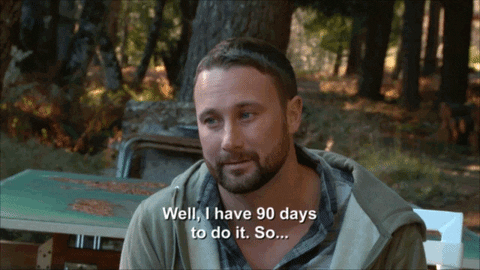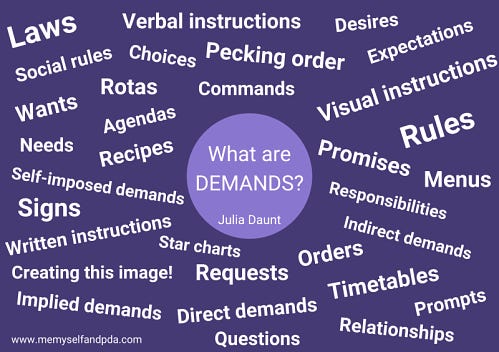Thanks for reading A Year of Mental Health! If you're enjoying it, consider supporting the project by upgrading your subscription. This grants you access to bonus tools and resources, as well as the joy of making the newsletter free to others. 💚 What Is "Demand Avoidance"? A Case StudyWhy you might put up a fight when asked to do simple things.This is the story of me failing to renew my driver’s license until the very last minute, one day before the year after it expired. It is also a story of something called demand avoidance. Just like time blindness, dyscalculia, ADHD, or high sensitivity, you may or may not recognize this trait in yourself, or perhaps in someone you know. If so, perhaps you can learn something. The goal is not to pathologize anyone’s behavior (more on that in this very post!) but to understand it. And of course, be sure to seek out a mental health professional instead of diagnosing yourself with anything. 💚 Why I Struggle at Anything Involving Bureaucracy (Among Other Things)I have very low frustration tolerance for navigating some simple challenges of daily life. Some of this is due to having ADHD—one of the core characteristics is being pretty good at some things and very bad at others. To provide a few examples:
Anyway, this brings me to the world of government ID, especially driver’s licenses. Needless to say, I’m not great with registering, renewing, or keeping up with anything of the sort. A while back, my drivers license was expiring and I kept forgetting about it. I finally decided to not worry about it until right up to the expiration date—and then I discovered a cool thing: you basically get a full year after your license expires before it’s ever really a problem. Fun Fact, You Can Wait a LONG Time Before Renewing Your LicenseThis isn’t really the point of the post, but I learned through this process that you can do almost anything with an expired license that you can with a valid one, at least for up for a year. Going through TSA? I did it 100+ times last year. Two or three of those times, the agent would look down and say, “Oh hey, this is like six months out of date. Maybe do something about that.” And I’d say “Sure, of course, no problem.” Renting a car? Also no problem, at least from the three agencies I did it with. ID check at bars and restaurants? Over and over. So basically, you get a whole extra year on your ID if you want it. Follow me for more life hacks! Back to the point: if you’re a chronic procrastinator, you know you will eagerly accept any chance to defer a problem for as long as possible. And so I did.But eventually, all timelines arrive at an end date, and I was finally at the point where I had to do something or it would get a lot worse. So last week, I dutifully made an appointment the day before my birthday—when my license would not only be expired but also “expired + 1 year,” which means something technical like really expired. Visiting the DMV on Day 364 of 365 (or “D-Day minus 1”)I made an appointment online (two weeks in advance!) and coordinated numerous logistics to make it happen. The whole time I was thinking, am I wasting my time? But it was the next step in the process, and I told myself that I had to try. In the end it came down to a 15-minute interaction with a clerk, one of the many people at the office in charge of checking credentials and getting people licensed up or turning them away empty-handed. My visit with her—she was really quite nice and helpful—sent me on a roller-coaster ride of emotions. I noticed a strong sense of rejection, despair, hopefulness, and (finally) relief during the course of the interaction.
If you don’t understand why this was so hard for me, I get it. In that case, you probably don’t have a problem with demand avoidance. What Are Demands and Why Do We Avoid Them?Demands are requests we encounter as we go through life. They are neutral, meaning that they aren’t necessarily good or bad—they’re just requests. It’s kind of like the word norms, which refers to a broad set of societal expectations. When it comes to demands, it basically means anything we encounter where we’re supposed to adjust our behavior. Here’s a helpful image (shoutout to Julia Daunt for making this). As you can see, we encounter a lot of demands! A lot of people—and institutions want something from us, and the sense of demand-receiving can be constant. We are always on the receiving end of demands. Some of us are less eager than others to respond positively to those demands. We are either pathologically avoidant, according to one definition, or simply have a strong (overriding) desire for autonomy. Why Does It Matter? Because Sometimes Avoiding Demands Is UnhelpfulYou might think, hey, nothing wrong with resistance. I don’t want to give in to someone else’s demands. And I would fully agree with you! The problem is that sometimes it is better to give in to certain demands, even from a strictly selfish perspective. In other words, demand avoidance can be harmful. This is something I’ve had to learn. I wrote about it in Lessons from Your Six-Year-Old Self:
If the lesson on walking away vs. fighting seems like common sense to you, again, you do not have this problem. Writers often use the term “resistance.” Believe me, it would be easier for me to write a book than to deal with bureaucratic institutions. If someone said to me, how about you write 30,000 words or fly to Singapore to give a talk instead of spending half the day on something bureaucratic, I’d choose the book or talk. But again, this isn’t necessarily the smartest move. It leads me to put off making healthcare appointments and many other things that would probably be good to do. And it’s not just me!
If some of these behaviors seem irrational, that is the point. They are not well-reasoned. But haven’t you ever made a poor decision, even realizing in the moment that it was a poor decision–yet you felt it was impossible to do something different? This is what extreme demand avoidance can turn into. It’s the AutonomyWithout getting into the weeds of a mental health terminology debate, the extreme version of this condition is sometimes categorized as Pathological Demand Avoidance, or PDA.¹ An alternative description, coined by Tomlin Wilding, uses the same acronym but calls it Pervasive Drive for Autonomy. This might be a better term all-around, both because it’s more affirming (resisting expectations is not necessarily pathological behavior, after all), and also because it places the desire for autonomy front and center.² As Dr. Megan Anne Neff writes:
There is much more that could be said about this, but once you understand how central the desire for autonomy can be for some people, their seemingly-irrational choices can make a lot more sense. Of course, choices can still be harmful, whether they are rational or irrational. But as with time blindness and other neurodivergent experiences, the more you know, the better off you are. In the End I Emerged VictoriousAfter a full year of unclear driving privileges and a lack of proper documentation, I was issued a brand-new license—valid for five years! Or as I like to think of it, six years since I get a free extra year after expiration. 🏆 As the credit card machine charged me $68, it triggered an MP3 file of an air horn that played throughout the DMV. I present to you the finest replica I could find: Yes! A bunch of balloons fell from the ceiling, everyone cheered, and a gospel choir started assembling in the back office. I left just as the van from a local TV station was pulling up for interviews. Okay, some slight exaggeration there. But I got a driver’s license! A legal, legit one. And I learned something about myself. Specifically, I learned about how the drive for autonomy (or demand avoidance if you prefer the original term) affects my life in both positive and negative ways. Am I going to change? Honestly, I’m not sure! It’s annoying that it’s incredibly difficult for me to do things like call to cancel an expensive subscription I don’t want, but on the other hand, most of the time, things work out just fine. If I don’t worry enough about insurance or government ID, I tend to think that “normal people” worry too much about trivial things. A good lesson for all of us to keep in mind is that life goes on, you know? Or at least it does for a while, and our task is to put the time we have to good use. So that’s what I try to do instead of worrying about things I’m not that great at. Which usually works out without too many problems! Except for once in a while like last week, when I find myself stressing out over something that many people find very simple. Conversation Starters1. Do you avoid demands? 2. Something you’ve learned about yourself recently. 3. Something that’s hard for you to do. 4. What you’re looking forward to this summer. (Or this winter, for our readers in the southern hemisphere.) 5. If you read the whole post, here is a cupcake for you: 🧁 1 Pathological Demand Avoidance is a formal diagnosis in the UK, but not in the US. Read more here. 2 See especially: Pathological demand avoidance: What and who are being pathologised and in whose interests? by Allison Moore in Global Studies of Childhood You're currently a free subscriber to 🌻 A Year of Mental Health. For the full experience, upgrade your subscription. |
Wednesday, April 10, 2024
What Is "Demand Avoidance"? A Case Study
Subscribe to:
Post Comments (Atom)
Welcome to Power Trends!
Hello, Thank you for subscribing! You will receive your first copy of Power Trends soon. We look forward ...

-
insidecroydon posted: " Become a Patron! What's on inside Croydon: Click here for the latest events listing...





No comments:
Post a Comment